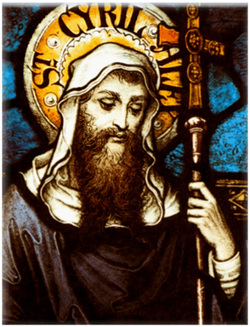
He burned with zeal for the salvation of souls, and took all care to keep the flock entrusted to him in purity of faith and life, and to guard them from the poisonous pastures of heresy and infidelity. Hence, in accordance with law, he caused the followers of Novatus to be expelled from the city, and procured the punishment of the Jews, whose rage had led them to plan a massacre of the Christians. Cyril's singular care for the preservation of the Catholic faith shone forth especially in his conflict with Nestorius, bishop of Constantinople, who declared that Jesus Christ had been born of the Virgin Mary as man only and not as God, and that the divinity had been bestowed upon Him because of His merits. Cyril in vain attempted to convert Nestorius, and then denounced him to Pope St. Celestine.
A delegate of Pope Celestine, Cyril presided at the Council of Ephesus where the Nestorian heresy was absolutely proscribed; Nestorius was condemned and deprived of his see; and the Catholic doctrine as to the unity of Person in Christ and the divine Motherhood of the glorious Virgin Mary was laid down amid the rejoicings of all the people, who escorted the bishops to their lodgings with a torch-light procession. For this reason Nestorius and his followers made Cyril the object of slanders, insults, and persecutions which he bore with profound patience, for he cared only for the faith, and paid no attention to what the heretics might do or say against him. At length he died a holy death, in the year of salvation 444, the thirty-second of his episcopacy, after having performed great labors for the Church of God, and having composed numerous works, both in refutation of paganism and heresy, in exposition of sacred Scripture, and in explanation of Catholic dogmas.




